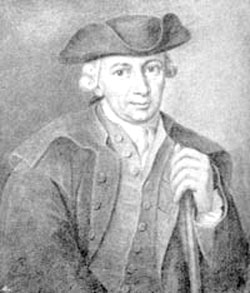| Johann Georg Hamann  Born: 27-Aug-1730 Born: 27-Aug-1730
Birthplace: Königsberg, Prussia, Germany
Died: 21-Jun-1788
Location of death: Münster, Westphalia, Germany
Cause of death: unspecified
Gender: Male
Religion: Protestant
Race or Ethnicity: White
Sexual orientation: Straight
Occupation: Philosopher Nationality: Germany
Executive summary: German theological thinker German writer on philosophical and theological subjects, born at Königsberg in Prussia on the 27th of August 1730. His parents were of humble rank and small means. The education he received was comprehensive but unsystematic, and the want of definiteness in this early training doubtless tended to aggravate the peculiar instability of character which troubled Hamann's later life. In 1746 he began theological studies, but speedily deserted them and turned his attention to law. That too was taken up in a desultory fashion and quickly relinquished. Hamann seems at this time to have thought that any strenuous devotion to "bread-and-butter" studies was lowering, and accordingly gave himself entirely to reading, criticism and philological inquiries. Such studies, however, were pursued without any definite aim or systematic arrangement, and consequently were productive of nothing.
In 1752, constrained to secure some position in the world, he accepted a tutorship in a family resident in Livonia, but only retained it a few months. A similar situation in Courland he also resigned after about a year. In both cases apparently the rupture might be traced to the curious and unsatisfactory character of Hamann himself. After leaving his second post he was received into the house of a merchant at Riga named Johann Christoph Behrens, who contracted a great friendship for him and selected him as his companion for a tour through Danzig, Berlin, Hamburg, Amsterdam and London. Hamann, however, was quite unfitted for business, and when left in London, gave himself up entirely to his fancies, and was quickly reduced to a state of extreme poverty and want.
It was at this period of his life, when his inner troubles of spirit harmonized with the unhappy external conditions of his lot, that he began an earnest and prolonged study of the Bible; and from this time dates the tone of extreme pietism which is characteristic of his writings, and which undoubtedly alienated many of his friends. He returned to Riga, and was well received by the Behrens family, in whose house he resided for some time. A quarrel, the precise nature of which is not very clear though the occasion is evident, led to an entire separation from these friends. In 1759 Hamann returned to Königsberg, and lived for several years with his father, filling occasional posts in Königsberg and Mitau. In 1767 he obtained a situation as translator in the excise office, and ten years later a post as storekeeper in a mercantile house. During this period of comparative rest Hamann was able to indulge in the long correspondence with learned friends which seems to have been his greatest pleasure. In 1784 the failure of some commercial speculations greatly reduced his means, and about the same time he was dismissed with a small pension from his situation. The kindness of friends, however, supplied provision for his children, and enabled him to carry out the long-cherished wish of visiting some of his philosophical allies. He spent some time with Friedrich Heinrich Jacobi at Pempelfort and with Buchholz at Walbergen. At the latter place he was seized with illness, and died on the 21st of June 1788.
Hamann's works resemble his life and character. They are entirely unsystematic so far as matter is concerned, chaotic and disjointed in style. To a reader not acquainted with the peculiar nature of the man, which led him to regard what commended itself to him as therefore objectively true, they must be, moreover, entirely unintelligible and, from their peculiar, pietistic tone and scriptural jargon, probably offensive. A place in the history of philosophy can be yielded to Hamann only because he expresses in uncouth, barbarous fashion an idea to which other writers have given more effective shape. The fundamental thought is with him the unsatisfactoriness of abstraction or one-sidedness, The Aufklärung, with its rational theology, was to him the type of abstraction. Even Epicureanism, which might appear concrete, was by him rightly designated abstract. Quite naturally, then, Hamann is led to object strongly to much of the Kantian philosophy. The separation of sense and understanding is for him unjustifiable, and only paralleled by the extraordinary blunder of severing matter and form. Concreteness, therefore, is the one demand which Hamann expresses, and as representing his own thought he used to refer to Giordano Bruno's conception (previously held by Nicolaus Curanus) of the identity of contraries. The demand, however, remains but a demand. Nothing that Hamann has given can be regarded as in the slightest degree a response to it. His hatred of system, incapacity for abstract thinking, and intense personality rendered it impossible for him to do more than utter the disjointed, oracular, obscure dicta which gained for him among his friends the name of "Magus of the North." Two results only appear throughout his writings -- first, the accentuation of belief; and secondly, the transference of many philosophical difficulties to language. Belief is, according to Hamann, the groundwork of knowledge, and he accepts in all sincerity David Hume's analysis of experience as being most helpful in constructing a theological view. In language, which he appears to regard as somehow acquired, he finds a solution for the problems of reason which Immanuel Kant had discussed in the Kritik der reinen Vernunft. On the application of these thoughts to the Christian theology one need not enter.
Do you know something we don't?
Submit a correction or make a comment about this profile
Copyright ©2019 Soylent Communications
|